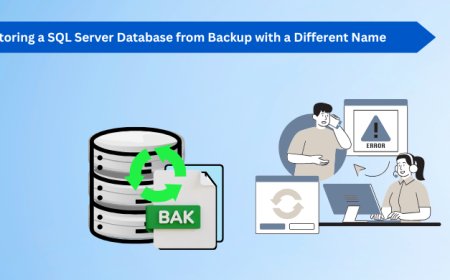Top Reasons to Invest in Cloud Solutions Consulting in 2025
Discover the top reasons to invest in cloud solutions consulting in 2025—maximize scalability, optimize costs, strengthen security, and drive digital growth.

As we step further into 2025, digital transformation is no longer just a trendit's a business necessity. Companies across every industry are turning to cloud technologies to remain competitive, serve customers better, and streamline internal operations. However, moving to the cloud or optimizing current cloud environments isnt always straightforward. It requires proper planning, the right tools, and, more importantly, expert guidance. Thats where cloud solutions consulting becomes essential.
Cloud solutions consulting involves working with professionals who understand cloud architecture, deployment models, and best practices. These consultants help organizations design, implement, and manage cloud strategies that align with their specific business goals. In this blog, well walk you through the top reasons why investing in cloud solutions consulting in 2025 is one of the smartest decisions a business can make, especially as the pace of technology and customer expectations continue to evolve.
Understanding Cloud Solutions Consulting
What Is Cloud Solutions Consulting?
Cloud solutions consulting is a service provided by experts who help businesses adopt, integrate, and manage cloud technologies. These consultants analyze an organizations infrastructure, business needs, and future plans to recommend the most suitable cloud platforms, services, and strategies. They often work with leading providers like AWS, Microsoft Azure, and Google Cloud, but they focus on making the cloud work specifically for your organization.
Their services typically include cloud readiness assessments, cloud architecture design, migration planning, security frameworks, compliance assistance, cost optimization, and post-deployment support.
Who Needs Cloud Solutions Consulting?
Cloud consulting isnt just for tech companies or large enterprises. Startups, mid-sized companies, and even government organizations benefit from these services. Whether youre starting your cloud journey or trying to scale your existing systems more efficiently, cloud solutions consulting provides tailored insights and avoids costly trial-and-error approaches.
Reason #1: Align Cloud Strategy with Business Goals
Personalized Planning
No two businesses are the same, which means a one-size-fits-all cloud solution rarely works. Cloud consultants help build a strategy that fits your specific goals, whether thats improving agility, cutting costs, enhancing security, or preparing for global expansion. They map out your cloud journey in a way that aligns with your business model and growth targets.
Future-Proofing Your Technology
With a solid cloud strategy in place, you can build for today and plan for tomorrow. Cloud consultants take into account your future needs and trends that may impact your industry, ensuring the solutions you invest in are scalable and adaptable for the long run.
Reason #2: Improve Security and Compliance
Built-In Cloud Security
Security remains a top concern for businesses shifting to the cloud. While cloud providers offer robust security features, misconfigurations or lack of expertise can still lead to vulnerabilities. Cloud consultants help design secure architectures and implement best practices to protect your data and applications.
Meeting Industry Standards
Many industries, such as healthcare, finance, and legal services, require strict compliance with regulations like GDPR, HIPAA, or ISO. Cloud consultants are familiar with these standards and ensure your systems meet all necessary requirements, reducing the risk of penalties and reputational damage.
Reason #3: Faster and Smoother Cloud Migration
Avoid Downtime and Disruption
Migrating existing systems to the cloud involves moving data, applications, and processes without interrupting business operations. Cloud consultants have the experience to plan each step carefully, minimizing downtime and avoiding common pitfalls.
Choosing the Right Tools
From selecting the appropriate cloud service model (IaaS, PaaS, SaaS) to choosing the right migration tools, cloud consultants provide technical expertise that ensures your migration process is fast, reliable, and successful.
Reason #4: Cost Optimization and Resource Management
Avoid Overspending
Cloud services can become expensive if not managed correctly. Its easy to leave unused resources running or over-provision infrastructure. Cloud consultants monitor usage patterns and optimize your setup to eliminate waste and reduce costs.
Pay-As-You-Go Efficiency
Consultants also help you make the most of cloud pricing models, such as reserved instances or autoscaling, so you're only paying for what you actually neednothing more, nothing less.
Reason #5: Boost Performance and Availability
Optimized Architecture
Cloud consultants design systems that deliver better performance through optimized load balancing, auto-scaling, and global content delivery networks (CDNs). They ensure that applications are responsive, even during peak traffic.
Disaster Recovery and Backup Planning
Reliable backup and disaster recovery strategies are essential for business continuity. Cloud consultants build solutions that can recover data quickly in the event of a system failure, minimizing downtime and data loss.
Reason #6: Enable Innovation and Speed to Market
Accelerated Development
With cloud solutions in place, businesses can develop and test new ideas faster. Consultants help set up DevOps pipelines and CI/CD tools, allowing for continuous development and integration. This means quicker releases and faster feedback from real users.
Support for Emerging Technologies
Cloud platforms support cutting-edge technologies like AI, machine learning, IoT, and big data analytics. A cloud consultant can help you integrate these tools into your business, giving you a competitive edge and opening new opportunities for innovation.
Reason #7: Enhance Remote Work and Collaboration
Access from Anywhere
With more teams working remotely, cloud solutions make it easy to access systems and data from any location. Cloud consultants design secure, reliable remote access systems that keep productivity high.
Cloud-Based Collaboration Tools
Consultants help businesses adopt collaboration tools like Microsoft Teams, Google Workspace, or Slack, which are deeply integrated into the cloud. These tools make teamwork smooth, whether people are in the office or working remotely.
Reason #8: Support Multi-Cloud and Hybrid Strategies
Avoid Vendor Lock-In
Relying on a single cloud provider can limit flexibility. Cloud consultants can design multi-cloud environments that spread workloads across different providers, reducing risk and increasing resilience.
Combining On-Premise and Cloud
In some cases, businesses want to keep part of their infrastructure on-premises while leveraging cloud capabilities. Cloud consultants help create hybrid solutions that offer the best of both worldsspeed, flexibility, and control.
Read more: Top Benefits of Investing in Cloud Consulting Services for Your Business
Reason #9: Ongoing Support and Optimization
Continuous Monitoring
The cloud environment isnt a set it and forget it system. Consultants provide ongoing monitoring to ensure performance stays optimal and systems are secure and up-to-date.
Regular Audits and Updates
As your business evolves, so do your cloud needs. Cloud consultants perform regular reviews and audits to adjust services, implement updates, and ensure youre always using the most efficient setup.
Reason #10: Get a Competitive Edge in 2025 and Beyond
Be More Agile
The businesses that can adapt quickly to change are the ones that succeed. Cloud consultants make your infrastructure more flexible and responsive, giving you the speed needed to make smarter decisions faster.
Improve Customer Experience
Whether its faster app load times, smoother online transactions, or personalized user experiences, cloud-powered systems deliver better service. Consultants help you fine-tune everything to ensure your customers always get the best.
Conclusion
In 2025, technology is moving faster than ever, and cloud computing is at the heart of this transformation. While the cloud offers endless opportunities, navigating its complexity can be a challenge. Thats why investing in cloud solutions consulting is such a wise move. Its not just about having access to the cloudit's about using it the right way, tailored to your specific business needs.
Cloud consultants bring valuable insights, expert guidance, and real-world experience to help you make informed decisions, avoid costly mistakes, and unlock the full potential of the cloud. From improved security and cost savings to faster innovation and better customer experiences, the benefits are clear. And if youre working with an on demand app development company, integrating cloud consulting into your strategy ensures your digital products are not only built efficiently but also built to scale and succeed in the modern world.
FAQs
What does a cloud solutions consultant actually do for a business?
A cloud solutions consultant evaluates your current systems, business goals, and technical requirements to design a custom cloud strategy. They help with migration, architecture planning, cost optimization, security, and ongoing cloud management.
Is cloud solutions consulting only useful for large enterprises?
No, businesses of all sizes can benefit. In fact, small and mid-sized companies often gain more because they can grow faster and smarter with expert guidance without needing a large in-house IT team.
How long does a typical cloud consulting project take?
It depends on the size and complexity of your systems. Some projects may take a few weeks, while larger migrations and long-term support models can span several months.
Can cloud consultants help with data security and compliance?
Yes, cloud consultants specialize in designing secure systems and ensuring that your cloud setup meets industry standards and regulatory compliance requirements.
Whats the difference between cloud consulting and managed cloud services?
Cloud consulting focuses on planning, strategy, and initial implementation. Managed services continue after deployment, offering ongoing support, monitoring, updates, and maintenance of your cloud infrastructure.


























